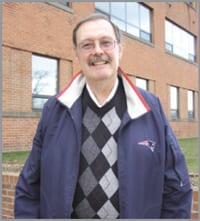At Work and at Play Recreation Management Students Have Many Career Options
It’s a course of study that could lead to a career as a ski instructor or coach. A park, resort, or health-club manager. A conference director or festival organizer. A therapeutic recreation supervisor or senior-center administrator.
In fact, those only scratch the surface of a list Matthew Pantera produced, detailing dozens of potential careers that could spring from Springfield College’s Recreation Management major — yet, in some ways, the department still flies under the radar.
“About 40{06cf2b9696b159f874511d23dbc893eb1ac83014175ed30550cfff22781411e5} of the students who end up in the Recreation Management program learn about this program after they’re at the college,” said Pantera, department chair and professor of Sport Management & Recreation. He credited good communication between academic departments for funneling many undeclared students in his direction, once they hear about the opportunities the program presents.
“We don’t get into turf battles, but we listen to what students’ needs are,” he told HCN. “There’s an open house for undeclareds a few weeks into the academic year, and professors go talk to students and show them what this program is all about with respect to the curriculum and careers they can get involved in, and what will these courses do to prepare them for employment.”
The major aims are to prepare graduates for leadership positions in programming, program design, personnel management, and research across the wide spectrum of recreation. Alumni are employed in resorts, the travel and vacation industry, corporate recreation services, campus and municipal recreation programs, recreation programs in the armed forces, camp management, and more.
To Your Health
But there’s a strong health component to the major as well, if students choose to pursue the major with the Therapeutic Recreation option, Pantera explained.
This option centers around the philosophy that recreation is essential to people’s overall development. Graduates work in various settings serving people with physical, emotional, psychiatric, and developmental disabilities; older adults need therapeutic care; people with chronic illnesses; people with substance-abuse problems; even people in correctional institutions.
Therapeutic recreation specialists may plan and coordinate recreation programs for patients in hospitals, nursing homes, adult day health centers, or other institutions. Activities may include sports, social activities, and arts and crafts.
These specialists may assess patients’ conditions and recommend appropriate recreational activities; help people reduce depression, stress, and anxiety; help patients recover basic motor functioning and reasoning abilities; and help integrate people with disabilities into the community using recreational activities, among other roles.
Students who choose this option may also complete the Child Life option, which prepares them for certification as a child-life specialist. “That’s big in our department,” Pantera said. “Those students will go on and work in clinical settings, using play and other mediums that a therapeutic recreation major would use, as they deal with children dealing with surgery and the like.”
While many students at Springfield College are intrigued by a career in recreation management after they arrive, others are persuaded by a strong alumni network and other influences while still in high school. Others pick up experience working in camp settings during their teen years.
“We see kids who have been working at camp, and we’re able to say to them, ’you can get paid and make a decent living working as a therapeutic recreation supervisor,” Pantera said. “I’ve seen students come in undecided about what they want to do, and then they sit down and look at our curriculum, and they get excited about therapeutic recreation.”
He said the curriculum focuses on developing four core strengths:
- Business. Pantera noted that many U.S. cities boast multi-million-dollar park districts, and the Springfield College program gives them the foundation in business to become assistant director or director of such a massive operation.
- He said growing financial constraints on municipalities have made it more important for recreation officials to become more creative. For example, “naming rights are something normally affiliated with pro sports teams, but many excellent municipal parks are seeking naming rights, as well as grants and donations, at the same intense level you see in sports management.”
- Programming. As one example of this emphasis, a sophomore-year practicum puts students at a recreation site for 120 hours, observing what the director and others do. This ties into:
- Critical thinking and problem solving. “Our freshmen received an incomplete grade in December for their Event Management class,” Pantera said as he spoke with HCN the day before the annual Hoophall Classic in Springfield. “That’s because they’ll finish up this weekend by helping to run the event.”
- Facilities. “Students need to know what the facilities process is all about,” Pantera noted, “to be involved in construction in a municipality, know what it’s like to build tennis courts, swimming pools, gymnasiums, and meet the program needs of the community.”
With those goals in mind, he said, “the key question is, ’can our students compete?’ I think they can be leaders in these areas. The National Recreation and Park Assoc. [NRPA] has teams of people, experts in the field, come out and evaluate our program once every five years. We received 15 commendations for our program. That’s not heard of — you expect maybe three or four, but Springfield got 15 commendations.”
Changing Landscape
Pantera has a deep background in recreation management, having spent 20 years as park and recreation director in Weston, Mass., which earned Gold Medal status from the NRPA during his tenure. He also worked in Brookline before coming to Springfield College.
“Here, I have a much broader reach, and I get to meet all these students going out to various municipalities as part of their careers. It’s fun being here.”
He’s also enthused about federal labor statistics in his field, partially driven by the aging of America.
“Recreation is a profession that will have faster-than-normal growth,” he said. As the Boomers age, there will be a whole opportunity for programming for the elderly at more intense levels.
“We’ve had senior centers going back to 1971, but I think they’re more sophisticated today,” Pantera said. “Years ago, when you looked at the appointment of people to those positions, a lot of them were appointed because someone knew somebody. But that was years ago; those days are long gone.”
As for elder-care facilities and other companies with a clinical component, “if you don’t have a therapeutic-recreation specialist on your staff, shame on you, because that whole population is a high-priority population. Many of our students go on to work in nursing homes, and there are jobs available in that area.”
Of the two branches of recreation management, clinical and non-clinical, “the fastest-growing component is in non-clinical settings,” he admitted, adding, “there’s great transferability, whether you want to work in a senior center, for a park service, or as a municipal park supervisor. For all of them, you need business skills, you need facilities skills, program skills, and problem-solving.”
Still, Pantera said, opportunities on the clinical level are on the rise.
Whatever a student’s career choice, he noted, the many permutations of recreation management fit well into Springfield College’s philosophy of humanics, a focus on education of the whole person — mind, body, and spirit — for leadership and service to humanity.
“We’re coaching them to choose a career that makes sense, but even in their private lives, they’ll still continue to be focused on humanics,” he said, stressing that service to others is inescapable in virtually all recreation-related careers. “Even after graduation, humanics should come to the forefront.”



Comments are closed.